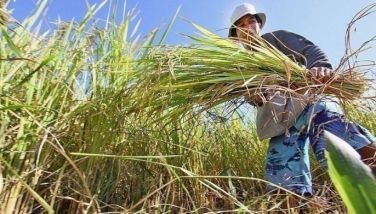Compost-based industry taking shape in Bicol
December 14, 2003 | 12:00am
A compost-based product industry is taking shape in the Bicol region.
This surfaced in a study done by researchers headed by Dr. Cely S. Binoya of the Bicol Consortium for Agriculture and Resources Research and Development (BCARRD) under the Compost-based Development Programs coordinated by the Los Baños-based Philippine Council for Agriculture, Forestry and Natural Resources Research and Development (PCARRD).
The survey covered 108 respondents, 95 of whom were farmer-users of compost-based products (CBPs) representing the vegetable, ornamental and cutflower, and fruit tree growers, seven producers; and six traders in Bicol.
The CBPs in Camarines Sur are used mostly for rice, vegetable and ornamental crop production. The province is the top producer of rice in the Bicol Region. The current agricultural production of Camarines Sur can supply 32,447 tons of rice hull and 510,776 tons of rice straw per cropping.
"This means an abundant source of composting materials for Bicol," the BCARRD research team said, as reported by PCARRD’s Ofelia F. Domingo.
Albay and Sorsogon use CBPs for growing seedlings of pili. Masbate uses it for mango production.
Vegetable growers also reported yield increase of anywhere from 25 to 80 percent depending on the crop, after composts have been applied. Similarly, yield increases of 25 percent and 35 percent were reported for pili and mango production, respectively.
A large-scale ornamental producer in Masbate applies compost in his three-hectare farm of chrysanthemum, daisy, gladiola, orchids, and roses.
Moreover, support structure for the industry in the region is in place, consisting of government agencies, stable colleges and universities, financial institutions, and public organizations. – Rudy A. Fernandez
This surfaced in a study done by researchers headed by Dr. Cely S. Binoya of the Bicol Consortium for Agriculture and Resources Research and Development (BCARRD) under the Compost-based Development Programs coordinated by the Los Baños-based Philippine Council for Agriculture, Forestry and Natural Resources Research and Development (PCARRD).
The survey covered 108 respondents, 95 of whom were farmer-users of compost-based products (CBPs) representing the vegetable, ornamental and cutflower, and fruit tree growers, seven producers; and six traders in Bicol.
The CBPs in Camarines Sur are used mostly for rice, vegetable and ornamental crop production. The province is the top producer of rice in the Bicol Region. The current agricultural production of Camarines Sur can supply 32,447 tons of rice hull and 510,776 tons of rice straw per cropping.
"This means an abundant source of composting materials for Bicol," the BCARRD research team said, as reported by PCARRD’s Ofelia F. Domingo.
Albay and Sorsogon use CBPs for growing seedlings of pili. Masbate uses it for mango production.
Vegetable growers also reported yield increase of anywhere from 25 to 80 percent depending on the crop, after composts have been applied. Similarly, yield increases of 25 percent and 35 percent were reported for pili and mango production, respectively.
A large-scale ornamental producer in Masbate applies compost in his three-hectare farm of chrysanthemum, daisy, gladiola, orchids, and roses.
Moreover, support structure for the industry in the region is in place, consisting of government agencies, stable colleges and universities, financial institutions, and public organizations. – Rudy A. Fernandez
BrandSpace Articles
<
>
- Latest
Latest
Latest
November 9, 2024 - 3:43pm
By E.H. Edejer | November 9, 2024 - 3:43pm
June 9, 2024 - 5:55pm
By Alberto Peña | June 9, 2024 - 5:55pm
May 24, 2024 - 10:00am
May 24, 2024 - 10:00am
May 14, 2024 - 3:43pm
By Ian Laqui | May 14, 2024 - 3:43pm
April 10, 2024 - 5:12pm
By Ian Laqui | April 10, 2024 - 5:12pm
Recommended


























